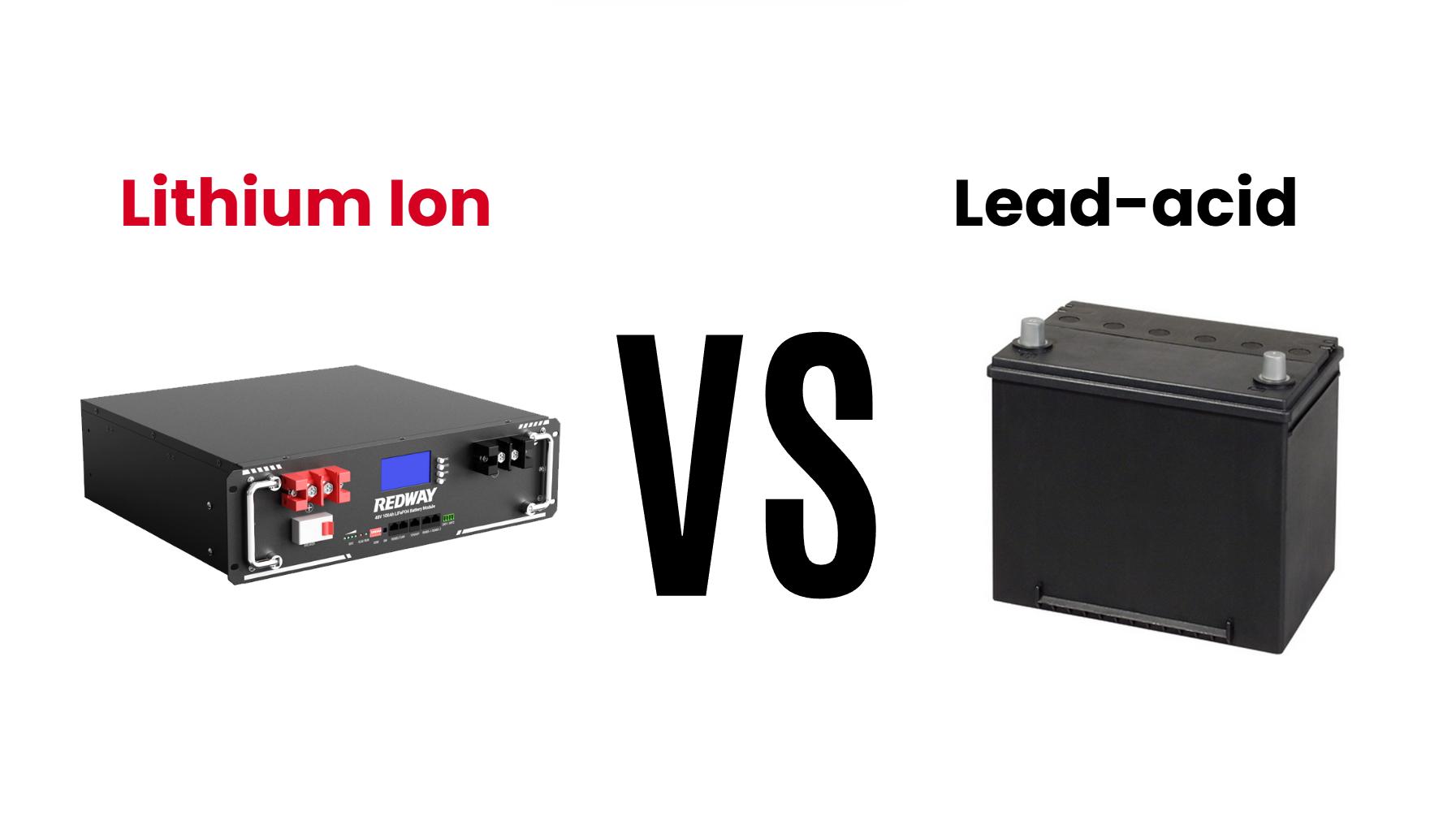Lithium-ion batteries provide higher energy density, longer cycle life, and faster charging compared to lead-acid batteries. However, lead-acid batteries are more affordable upfront and widely used in industrial applications. The choice depends on specific usage scenarios and budget considerations.
In today’s dynamic industrial landscape, selecting the optimal battery technology is pivotal for ensuring peak performance, reliability, and cost-efficiency. Lithium-ion and lead-acid batteries are the predominant choices, each offering unique advantages and drawbacks. This article provides an in-depth comparison of these two battery technologies, helping you make an informed decision tailored to your industrial needs.
Lithium-Ion Batteries
Advantages of Lithium-Ion Batteries
High Energy Density
Lithium-ion batteries are renowned for their high energy density, allowing them to store more energy in a smaller and lighter package. This characteristic is particularly beneficial for applications where weight and space are critical, such as electric vehicles and portable equipment.
Long Lifespan
These batteries have a significantly longer lifespan compared to their lead-acid counterparts. With proper maintenance, industrial lithium-ion batteries can last for several years, translating into reduced replacement costs and minimized downtime over the equipment’s lifespan.
Fast Charging Capabilities
Lithium-ion batteries can be charged much more quickly than lead-acid batteries, reducing downtime and enhancing operational efficiency. This feature is especially advantageous in applications requiring frequent charging, such as material handling equipment and backup power systems.
Disadvantages of Lithium-Ion Batteries
Higher Upfront Cost
One of the primary drawbacks is the higher initial cost. The advanced technology and materials used in lithium-ion batteries contribute to this higher price point, which can be a barrier for some industrial users.
Need for Battery Management System (BMS)
A BMS is essential for monitoring and regulating the charging and discharging processes, ensuring the battery’s safety and longevity. While it adds an extra layer of protection, it also increases the overall complexity and cost of the battery system.
Potential Safety Concerns
Improper management of lithium-ion batteries can lead to thermal runaway, resulting in fire or explosion. However, these risks can be effectively mitigated by partnering with experienced manufacturers who adhere to strict safety guidelines.
Lead-Acid Batteries
Advantages of Lead-Acid Batteries
Lower Upfront Cost
Lead-acid batteries are more affordable initially due to their well-established materials and manufacturing processes. This makes them an attractive option for budget-conscious industrial users.
Proven Reliability
With a long history of use in various industrial applications, lead-acid batteries are known for their consistent power output and ability to withstand demanding conditions. This reliability is crucial for applications requiring an uninterrupted power supply, such as backup power systems and off-grid installations.
High Recyclability
Lead-acid batteries are highly recyclable, with established recycling infrastructures in place. This reduces their environmental impact and contributes to a circular economy.
Disadvantages of Lead-Acid Batteries
Lower Energy Density
Lead-acid batteries are heavier and bulkier for the same energy storage compared to lithium-ion batteries, which can be a challenge in applications where weight and space are critical factors.
Shorter Lifespan
They generally have a shorter cycle life and may require more frequent replacements, especially in demanding industrial applications.
Slower Charging Times
Lead-acid batteries take longer to charge, resulting in longer downtime during charging cycles. This can impact productivity and efficiency in settings where continuous operation is crucial.
Comparative Analysis
Energy Density and Weight
Lithium-ion batteries have a clear advantage in terms of energy density and weight, making them suitable for space-constrained applications.
Lifespan and Maintenance
Lithium-ion batteries generally offer a longer lifespan and require less maintenance, which can result in lower long-term costs and reduced downtime.
Cost Analysis
While lithium-ion batteries have a higher upfront cost, their longer lifespan and reduced maintenance can lead to a lower total cost of ownership. Lead-acid batteries, however, may be more suitable for applications with strict initial budget constraints.
Safety and Environmental Factors
Lithium-ion batteries require careful management to avoid safety issues, whereas lead-acid batteries have a well-established safety record. However, lead-acid batteries contain hazardous materials that require proper disposal to minimize environmental impact.
Choosing the Right Battery
Assessing Application Requirements
Evaluate your application’s power and energy storage needs, considering factors such as voltage, capacity, and discharge rate to ensure the chosen battery meets your performance demands.
Budget Considerations
Analyze both upfront costs and long-term expenses. While lithium-ion batteries may offer a lower total cost of ownership due to their longevity and lower maintenance, lead-acid batteries may be more feasible for limited initial budgets.
Weight, Size, and Charging Speed
Consider the importance of these factors in your application. If a lightweight, compact battery with fast charging capabilities is essential, lithium-ion may be the preferred choice. If these factors are less critical, lead-acid batteries might be a more viable option.
Consulting Experts
Engage with battery experts to gain insights and personalized recommendations. Professional guidance can help navigate the complexities of battery selection, ensuring you choose the optimal technology for performance and cost-effectiveness.
Conclusion
Selecting between lithium-ion and lead-acid batteries for industrial applications hinges on understanding their distinct characteristics and aligning them with your specific needs. Lithium-ion batteries offer high energy density, long lifespan, and fast charging but come with higher costs and complexity. Lead-acid batteries, while more affordable initially, provide proven reliability and recyclability but have lower energy density and shorter lifespan.
By carefully evaluating your application requirements, budget constraints, and long-term goals, and consulting with reputable manufacturers, you can make an informed decision that optimizes performance and value.
Investing in high-quality industrial battery solutions from trusted manufacturers ensures reliable and efficient operations. Choose wisely to enhance the productivity and sustainability of your industrial applications.




